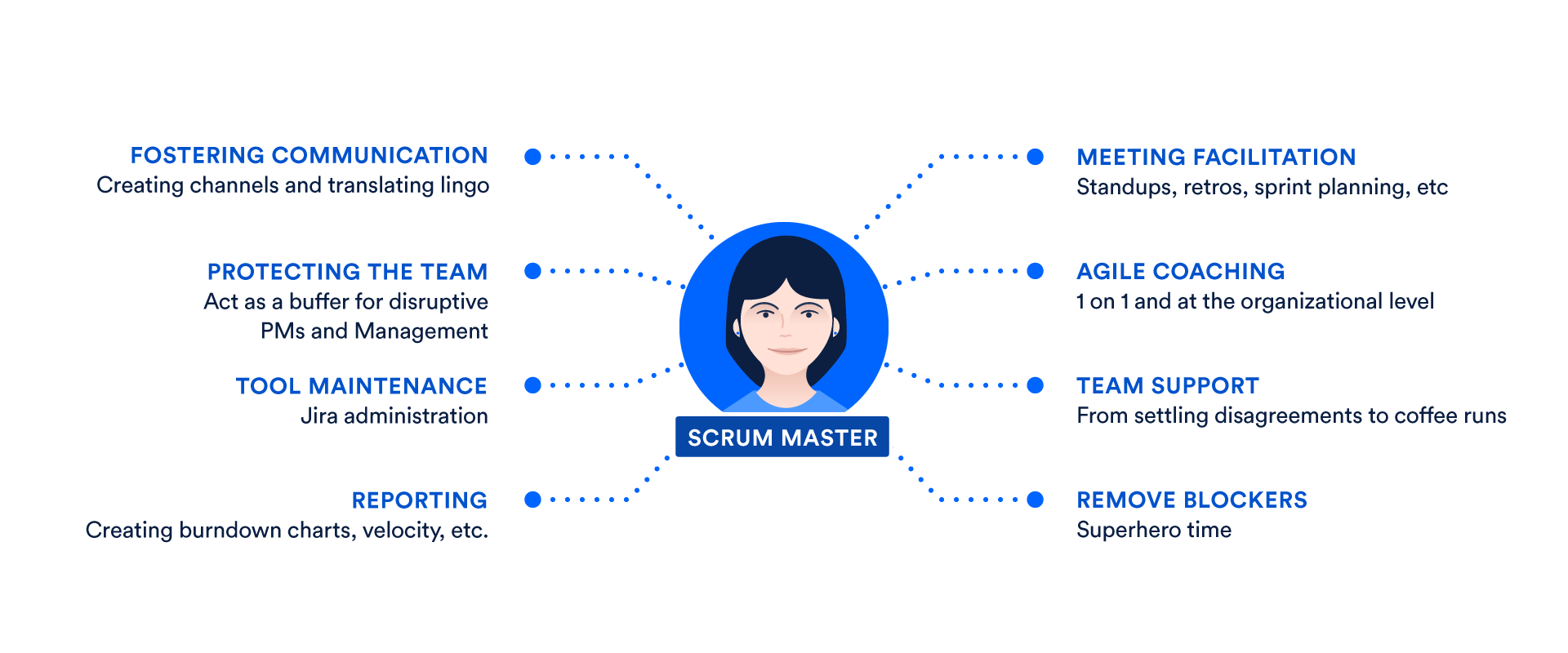Summary: The scrum master serves to facilitate scrum to the larger team by ensuring the scrum framework is followed. He or she is committed to the scrum methodology, agile principles, and best practices—but should also remain flexible and open to opportunities for the team to improve their workflow.
As the title implies, the scrum master is the master of scrum, who ensures the scrum framework is followed. Scrum has a clearly defined set of roles and rituals that should be followed and the scrum master works with each member of the scrum team to guide and coach the team through the scrum framework.
What is a scrum master?
A Scrum master is the facilitator of scrum, a lightweight agile framework focusing on time-boxed iterations called sprints. Scrum masters act as coaches to the rest of the team, or servant leaders, as the Scrum Guide puts it.
Good scrum masters are committed to the foundational elements of scrum but remain flexible and open to opportunities for the team to improve their workflows.

Scrum master responsibilities
Although the scrum guide lists how scrum masters can serve other scrum team roles, it doesn’t provide an exhaustive list of potential responsibilities. Scrum masters often perform many of the following duties:
- Standups: Facilitate daily standups (or the daily scrum) as needed.
- Iteration/sprint planning meetings: Protect the team from over-committing and scope creep. Aid in estimation and sub task creation.
- Sprint reviews: Participate in the meeting and capture feedback.
- Retrospectives: Note areas for improvement and action items for future sprints.
- Board administration: Work as the administrator of the scrum board. Ensure that cards are up to date and the scrum tools like Jira are working well.
- 1 on 1s: Meet individually with team members and stakeholders as needed. Iron out team disagreements about process and work styles. Many scrum practitioners oppose 1on1, believing these communications should happen during standups. However, new teams often prefer to have these regular face-to-face interactions with specific team members. The scrum master may decide that these individual interactions are crucial for team development and getting to know one another.
- Internal Consulting: Scrum masters should consult with team members and internal stakeholders on how best to work with the scrum team.
- Reporting: Regular analysis of burndown charts and other portfolio planning tools to understand what gets built and at what cadence.
- Blockers: The scrum master aids the team by eliminating external blockers and managing internal roadblocks through process or workflow improvements.
- Busy work: If the scrum team isn’t functioning as well as it could be, that’s the scrum master’s problem. Maybe that means fixing broken computers, moving desks around, or even adjusting the thermostat. Scrum masters should be comfortable doing just about anything to help their team and should be not shy away from grabbing coffees, providing snacks, or adjusting the thermostat if that’s what the team really needs.
Scrum master skills
Scrum masters require a unique set of soft skills to effectively fulfill their roles. Here are some of the key skills and qualities needed to excel as a scrum master:
- Leadership: Scrum masters must exhibit leadership qualities without being authoritative. They lead by serving the team and facilitating their self-organization.
- Effective communication: Clear and transparent communication is crucial. Scrum masters ensure all team members and stakeholders understand the project's status, goals, and obstacles.
- Empathy: It is essential to understand and empathize with the team's challenges. Scrum masters need to support and motivate team members during difficulties.
- Problem-solving: Scrum masters often deal with impediments and conflicts. They must be adept at problem-solving and finding solutions to keep the team on track.
- Adaptability: Scrum masters should be adaptable and open to change. They need to adjust to the evolving needs of the team and the project.
- Facilitation skills: The ability to effectively facilitate meetings and scrum ceremonies is vital. Scrum masters ensure these events run smoothly and focus on the intended outcomes.
- Coaching and mentoring: Scrum masters coach and mentor team members in agile and scrum principles, helping them continually improve.
- Technical knowledge: While not mandatory, having a technical background can be beneficial, especially when working with development teams. It allows scrum masters to better understand the technical challenges faced by the team.
- Time management: Scrum masters must manage time effectively to keep the team on schedule and meet sprint goals.
Scrum team
The scrum team is a fundamental aspect of the scrum framework. It typically consists of the following roles:
- Development team: These are professionals with the skills required to deliver a potentially shippable product increment. The development team is responsible for the actual work of creating the product.
- Product owner: The product owner represents the interests of the stakeholders and is responsible for managing the product backlog and prioritizing work.
- Scrum master: As discussed in the previous sections, the scrum master is pivotal in facilitating the scrum process and ensuring that the team adheres to scrum principles.
Scrum framework
The scrum framework is a structured approach to agile project management methodology. It consists of several components, including:
- Sprints: Sprints are time-boxed iterations, typically two-to-four weeks in length, where the development team works to complete a set of planned work items.
- Product backlog: The product backlog is a prioritized list of all the features, enhancements, and bug fixes the product needs to address. The product owner manages and maintains this backlog.
- Sprint backlog: The sprint backlog is a subset of the product backlog, containing the work items selected for a specific sprint.
- Scrum artifacts: Scrum employs various artifacts, such as burndown charts and task boards, to track progress and make the work visible to the team and stakeholders.
- Scrum events: Scrum events, including sprint planning, daily stand-ups, sprint reviews, and sprint retrospectives, provide structure and opportunities for collaboration within the team.
The scrum framework emphasizes flexibility, adaptability, and continuous improvement, making it a popular choice for managing complex projects in an agile manner.
When teams needs a scrum master
Any scrum trainer will teach that a scrum team must have a scrum master. Without one, you are doing something shy of a true scrum, often called scrum-but.
When starting with scrum, it can be a huge help to have someone in the role who has seen scrum work before. For this reason, scrum masters are often hired as consultants or fractional employees rather than as full-time staff members. However, every scrum team is different.
Many experienced teams handle the responsibilities listed above as a unit and take pride in sharing management duties. The scrum master role may rotate throughout the team, with different team members taking turns facilitating standups and retrospective meetings.
“At the end of the day, the entire team owns the scrum process, so a good scrum master will find ways to encourage that ownership,” explains Atlassian’s Modern Work Coach Mark Cruth.
Unfortunately, misunderstanding the scrum master role often leads existing managers to assume it is their role. “It’s not unusual for a Scrum Master to support more than one team,” Cruth continues. “There is a ton of work that goes into the facilitation, coordination, and coaching of work, and if spread too thin the Scrum Master may not be effective in helping the organization move into this new way of working. It’s important to ensure they are not over-extended.”
To better understand why this can be a problem, let’s compare the scrum master job description to non-scrum roles you may already have in your company and examine why keeping the roles separate is important.
Scrum master vs. product owner
When an organization adopts Scrum, it’s not uncommon for a project manager to support a new role - scrum master or product owner – to support the new needs of the organization. “If they enjoy the leadership, facilitator, and process aspects of project management, I typically recommend exploring the Scrum Master role,” suggests Cruth. “If they enjoy the project scoping, direction setting, and stakeholder management, I typically recommend exploring the product owner role.”
Scrum masters and product owners should serve distinct roles on a scrum team. When roadblocks arise, a clear division between process management and product direction is paramount.
As we advocate in our Agile Product Management overview, the more involved that a product manager is with the development team, the better. A project manager’s involvement is similar to a product owner who champions customer needs and the "why" of the product. When their involvement extends to dictating the "how" for a team, problems tend to emerge.
Having an effective scrum master in place helps balance the cost of changing course with the benefits of efficiency. A good scrum master does this by empowering the team to decide how to best accomplish goals through self-organization.
Scrum master vs. project manager
The scrum master’s non-technical counterpart is the project manager. Both roles focus on the “how” of getting work done and solving workflow problems through process improvement. Are both roles required to manage agile projects successfully? The short answer is no.
While a traditional project manager and a professional scrum master are responsible for helping their teams get work done, their approaches are vastly different. Project managers set project milestones, report on team progress, and facilitate effective communication. However, they do so from a place of control.
Conversely, scrum masters help teams enhance and streamline the processes by which they achieve their goals. They do so as a team member or collaborator—not by exerting total control. The best scrum teams are self-organizing and, therefore, don’t react well to micromanagement.
These are just a few of the possible configurations of scrum team management. Some companies make do with all of these roles, some have one or none at all.
Organizational benefits of scrum masters
When hiring a scrum master, one key consideration stands out. Your company should be wholeheartedly committed to the scrum framework. A scrum master can truly excel when companies fully embrace core scrum principles.
With a scrum master assisting every team in managing their processes, entire companies can benefit. This approach ensures consistent value delivery to customers and allows team members and managers to focus on their core strengths.
Product managers can concentrate on strategy, developers can shine in writing top-notch code, and sales team members can realize greater success. This is the essence of a well-functioning scrum.
Get started free with the Jira scrum template
Streamline your project and easily plan, track and manage work across sprints. The Jira scrum template includes boards, backlogs, roadmaps, reports — and more!
.jpg?cdnVersion=2566)